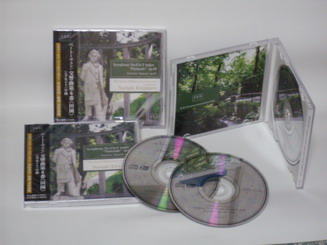

| @NKB@TOP@ | @contents | @CD@ | @shop@ | @Request@ | @Link@ |

@
The first work Beethoven Symphony No.6gPastoralh& OverturegEgmonth
ConductF@Noriaki KITAMURA
OrchestraF@The Slovak Philharmonic Orchestra
Recording placeF@Slovak Republic, Bratislava, Concert Hall of the Slovak Radio
Recording dateF@2010,@May@8th
& 9th
This
BGM is our CD.
BEETHOVEN's Symphony no.6 "Pastorale" beginning of III.


Recording travel photo sketch here.
@
Used scoreF@Bärenreiter URTEXT TP906iSymphony No. 6
in F major op. 68 gPastoralhj
@@@@@@@ Breitkopf & Härtel URTEXT Nr.
14640iOverture gEgmonth op. 84j
Recording sound sourceF@There are three sources this time.
@P.Edited by the staff of Slovak Radio in general way i24bit
samplingj.
@Q.Whole performance directly stereo recorded to the most
up-to-date model (1bit recorder of KORG Co.) and edited by
Japanese engineer (Mr. Teruo Murakami)
@R.Whole performance recorded to 1bit recorder through
one-point microphone.
@
@
Conductorfs comment
@
@I used scores of URTEXT ithe original text editionj. As a matter of common sense in the present, I made an effort to meet the composer's aim as possible as I could.
@But some points differ with these scores.
@The
first point is tempo. I have some doubt about the tempo that is
written by Beethoven himself essentially. I have claimed there
were problem of graduation of metronome in those days and it is
fast about 10%. Therefore the tempo that suits to my thought is
standard. But the most important aim of my performance is neat
one of neat sound. It's no problem to be influenced by the
present situation, I feel. On the whole, the tempo resulted a
little slow. Especially the beginning of whole performance that
was in the last session was quite slow. It goes together with
politeness of performance, not to be denied, so I continued.
@The second point is agogic (change of tempo). Sometimes you can hear where the original score has no agogic. These are done spontaneously in the performance. And these are rather the results of good ensemble, so I did not revise.
The third point is trifle. I put off the start of decrescendo in the end of phrase, for example bar 6 of U movement, for one eight τ. This is correct descriptively, but I dared to do. If the players pay attention to this, appoggiatura of the beginning of this beat may lose its effect. That is the result that I made an effort to be faithful to score icomposerj as possible as I could.
@
@This time, I thought this land is the best to record gPastoralh.
As Beethoven composed this music in a suburb of
@He, Beethoven was born in
@There are plural reasons why I chose gEgmonth for coupling. First, this year is just the 200th year when it was composed. That does not have a big meaning. Another is expectation for sympathy of people that experienced destruction of communism, as everyone knows. Further, I heard that this revolution was not tragic as was called gvelvet revolutionh. If I insist that was realization of Egmontfs ideal revolution. I donft understand how much they know about that. Further, because gPastoralh is a very serene and peaceful scene I selected as a contrastive one.
@I think it was a big virtue of introducing deep sound of
strings of this orchestra by this music.
@I also think it was a big success of making naive and sincere
figure toward the music of this orchestra to the sound by gPastoralh.
@I regret that such orchestra of good quality is not known much in my country. I am very glad to be able to introduce for this chance.
@I would like to take this opportunity to express my appreciation to members of the Slovak Philharmonic Orchestra, manager Ms. Tatiana Schoeferova, Mr. Pavel Hruby, and interpreter Ms. Kinga Valent.
I would like to thank engineer Mr. Hubert Geshwandtner
and producer Mr. Emil Niznansky of the Slovak Radio. I deeply
thank recording engineer Mr. Teruo Murakami who has been with me
from
I would like to give my best regards to people that support this project, Mr. Mitsuaki Kukita that is auditor of NKB and handled general office work, Ms. Hiromi Kitagawa that is manager of NKB and treats general financial affairs, puts documents into English, and negotiated with Slovak side, and Mr. Takuhide Mizuhara that is vice-chief manager and supervisor of NKB.
Conductor Noriaki Kitamura
@
my thoughts to Symphony gPastoralh
detailed interpretation of gEgmonth Overture
I put them each.
If you are interested in them please access.
@
@
copyright 2010 NKB gen. as. All right reserved
@